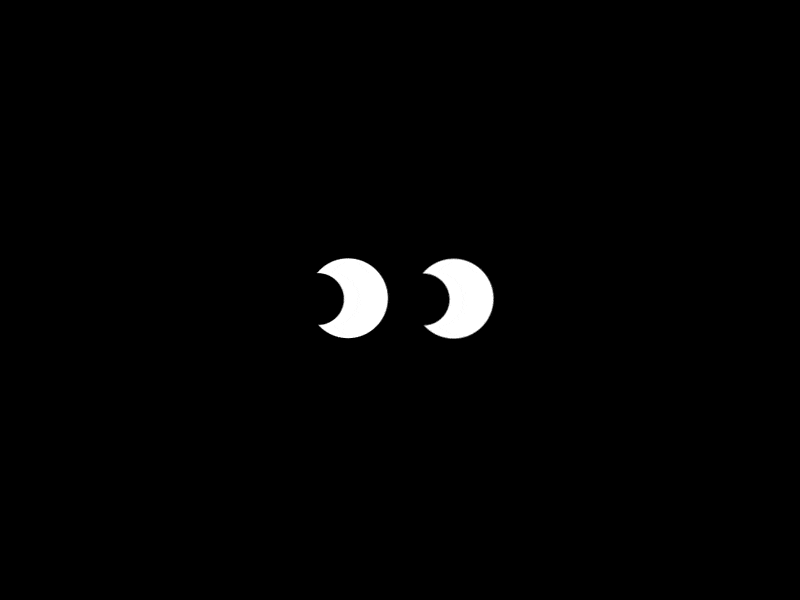Hey, it’s been a while. I hope that everyone is doing okay and safe. Apologies, I was too lazy and (busy too) these past few months.
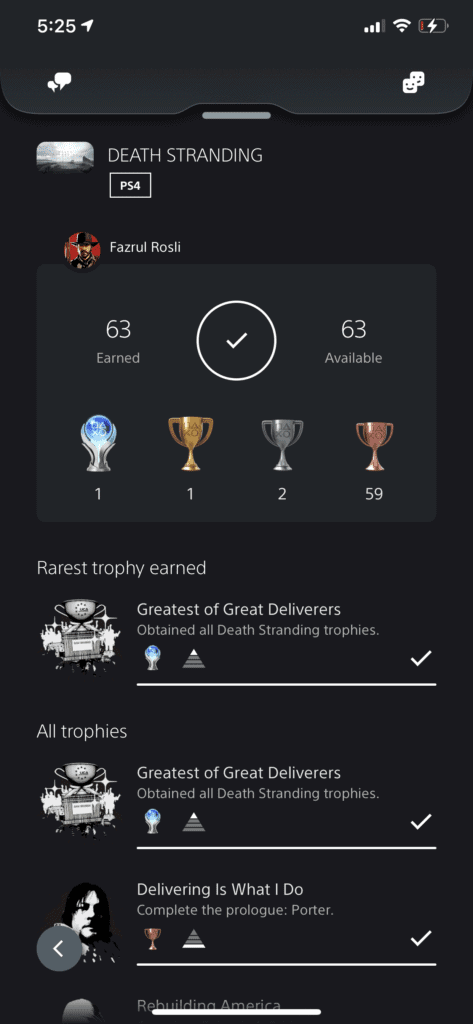
It’s June 2021. Pandemic, recession and unemployment. It is awful. But know that no evil lasts forever nor good that never ends. Before it gets too dark, I would like to share some tips/tricks you can use to apply for a career in Market Research. It is a solid career to have if you are brave enough to suck at something new. And if you are not interested, you may scroll down and download the editable ppt CV/resume at the end of this post.
If you are interested and want to get a sneak peek from an insider who has spent ten years in the industry (not from HR head-hunters who know nothing about the industry trying to make everything sound more complicated than it should), this is the post for you.

What is Market Research?
The first thing you need to understand is what market research is. Thousands of websites and blogs talk about this, so let’s not go there.
Market research wants to know what people would buy or how they act, behave, and decide. That’s it. Clients usually commission market research studies to collect and analyse the data, and the market researcher gives recommendations based on the findings.
Occasionally, they conduct the study without the client commissioning anything, and they sell the data to whoever is interested (usually called a syndicated study).

Types of work in market research
In market research, there are different fields of expertise:
- Market Research (aka Market Intelligence / Client Servicing / Consumer Insight) – divided into quantitative and qualitative
- Project Management
- Operations – Recruitment team, quality control etc.
- Specialised – Business development, creative, marketing etc.
- Business support – Admin, finance, IT, etc.
Let’s focus on market research expertise. There are two types of market research approaches;
- Qualitative – it’s about quality over quantity. For example, you want to understand why people buy something or behave a certain way. It is the study to understand a particular phenomenon.
- Quantitative – it’s about quantity over quality. For example, how many Chrome tabs can you open with 1 TB RAM? It requires statistics, numbers and facts—anything you need to measure or validate.

Here is a pic for a case study. Quantitative would be able to measure how many visitors took a pic with the statue, and you would probably see that most visitors are attracted to the nipples and the nose. But we have no idea why until we ask the people. Are they horny? Is it a local tradition? Primal instinct? For luck? Hence, qualitative research is needed to answer this nipple conundrum.
Which is superior, Qualitative or Quantitative? Which one is more accurate? They are both equally important and precise. There’s no one right way of viewing the world or one right way to gain knowledge or the truth. Market research is very much at the intersection of qualitative and quantitative. Most people have confidence when numerical units or facts back it up. However, qualitative is needed to describe the meaning behind its numbers. If you need to crunch data but not interpret what it means, then a computer would be able to do it.

Qualification/characteristic for MR Job
The requirements for MR jobs are basically 80% similar to succeeding in any job, with 20% market research-specific skills. I hired a few executives before despite their technical skills as it is something that they can learn on the job, but attitude is more important.
Some typical traits and necessary skills (and keywords that you should highlight during the interview):
- Attention to detail and good organisational skills (if you are looking for entry-level)
- Childlike curiosity
- Ability to interpret the data
- Communication skills – language proficiency, etc.
- Good interpersonal skills – Essential for qualitative
- Storytelling and presentation (for mid-high level) – this skill would set you apart and often overlooked. If you can tell a clear and consistent story full of insights, then you are already a beast
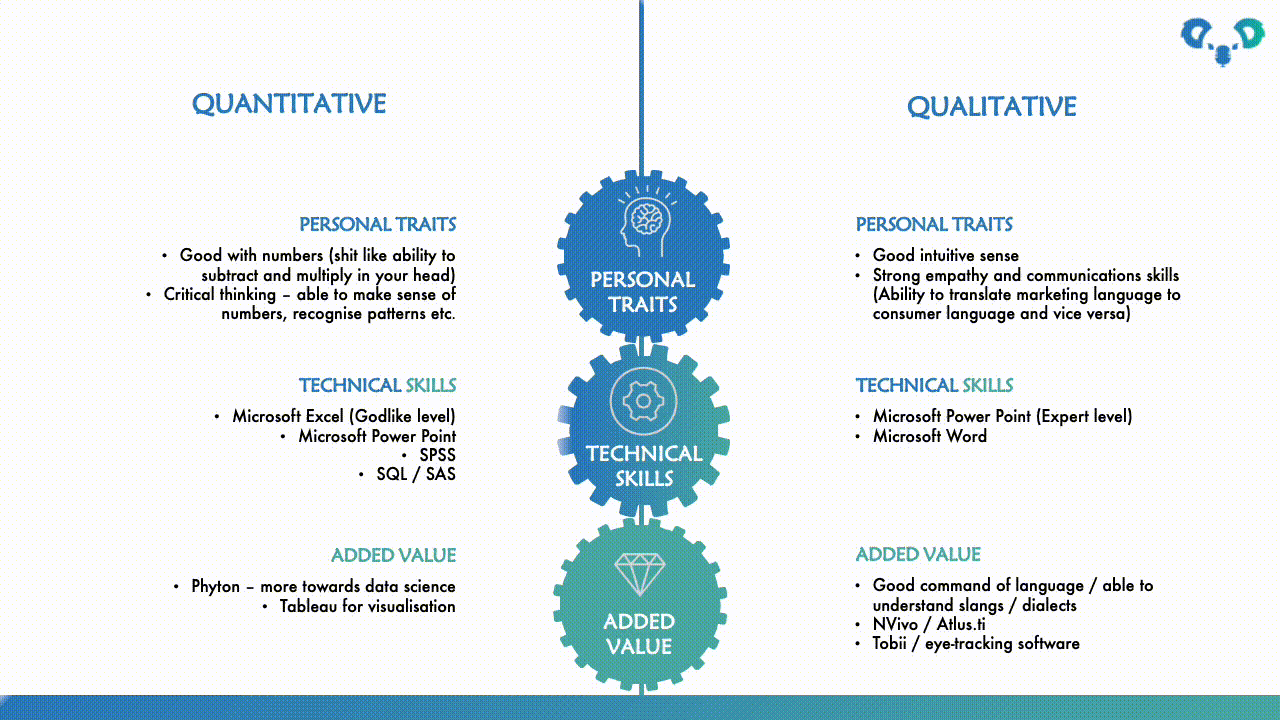
Despite what other recruiters might say, you don’t need a specific degree to excel in both. But you would have a higher chance of landing the job if you have statistics, marketing (for quant) or psychology (for qual) related academic background.
Quantitative is what most research jobs look for. Qualitative has lower demands but actually pays more because they are more like mythical creatures.
A quick search on Glassdoor shows the monthly salary for a junior level. PS: The salary is identical to when I started my career 15 years ago, so take it with a grain of salt and do your due diligence.
| Field | Malaysia | US | India |
| Qualitative | RM3700 | USD4300 | 5.6 Lakhs |
| Quantitative | RM3500 | USD4000 | 4.5 Lakhs |
Know your strengths and weaknesses. If you still use a calculator to solve 9 + 7 because you have trust issues, then quantitative is not for you. If you can’t stand talking to strangers and hate people in general, then maybe qualitative is not for you.


Pros and cons of the Market Research Profession
“People actually pay you, so you can learn about things”
Suzanne Huang, one of my ex-directors in Kantar
Pros
- A fly on the wall – You would learn so many things. This is what I love the most. You could meet many interesting people: consumers, professionals, VIPs etc. Some projects are highly confidential; some would give you a sneak peek of innovation, cut the story short, and a lot of cool stuff.
- Satisfaction of solving a problem – if you love finding ways/insights to make a better business decision, you can’t go wrong with market research. That’s what I love about research – these eureka moments. When things finally come together. One then forgets all the years of tedious work that preceded. It’s like you are playing Uncharted 4 in real life.
- You’ll be an intelligent consumer. You would have the privilege of seeing and understanding how marketing works, what the brand is all about, the proper way to use it, their target market, etc.
- Beacon of light/Point of Reference – people would want to know what you know, and it would help you to be a reference point – no one can argue when you have a deep understanding of the consumers’ market and when you back it up with numbers.
- Help sharpen your business acumen – you’ll know the market, understand what makes consumers tick, learn how to advertise, and send the right signals. It will help you sell any products/ideas later in your life.
Cons
- You need to be morally flexible – some of the clients that you gonna work with are; for the lack of a better word – utter and complete shit. Sometimes, the research objective can be downright immoral, like how to persuade kids to drink a beverage full of sugar and market it as something healthy. I don’t use and buy some of my client’s products because they are pure evil (Nestle is fucking evil). But once you reach a certain level, you can tell your superior that you don’t want to serve a particular client. But until then, I’ll give the most useless currency ever; here, some thoughts and prayers for you.
- Sometimes, the job can be so boring, particularly when the client is trying to solve a problem where there is none. Or when they are trying so hard to get that sweet ESG Blackrock money and trying to ask consumers if they are doing enough for the environment and diversity. Sorry, I just had a mini vomit.
- Weird encounters – You would encounter many exciting but sometimes disgusting people. I once met a woman who lived in a house full of rubbish and maggots or a racist person who would insult your ethnicity; genuine stupidity, hate and all negative expressions humankind can offer.
- Poor work-life balance/integration. We’ll discuss this further in the next section.
- Might need to travel intensively.

Where can you get a job in market research?
There are several places where you can get a market research job:
- Big market research agencies – Like Kantar, Nielsen, Ipsos, GFK, etc.
- PROS: Good training program, huge exposure as you work with a huge array of clients, good support and mentorship, good salary, higher chance to work in other markets/expertise, more straightforward analysis.
- CONS: Higher chance of long working hours, leading to faster burn-out.
- Small-medium market research agencies – Find smaller market research agencies in your country – get the listing from the ESOMAR directory.
- PROS: High involvement; do everything from beginning to the end – you’ll learn faster, close-knit environment; more “family” relationship, good support, better bonus and paycheck, simpler analysis.
- CONS: You’ll get burned out way too fast, have a sense of feeling lost, and have crazy working hours; the boss would sometimes milk the “we are family” excuse dry.
- Client-side – Big Corporations, i.e. Shell, Google, etc.; often called Consumer Insight or Market Intelligence.
- PROS: Better salary than research agencies (usually), better work-life balance, agency people would treat you like God, more straightforward analysis.
- CONS: Slower learning progress; you won’t be able to learn a lot from other industries or methodologies, etc., not much empowering; more like an intermediary between agencies and decision-makers in your company
- Consultancy Firm – Like PwC, McKinsey etc.
- PROS: High salary, bragging licence, access to better mentorship/facilities/research tools, wide exposure, more complex analysis..
- CONS: Crazy working hours, can be siloed.
Career-wise, if you are interested in market research, I suggest you start with a big agency that works across industries. It will give you more experience within various industries and project types. The more you are exposed early in your career to various projects, methodologies and involvement in every step of the process, from setup to client presentation – the better off you will be.
The client side is also good, don’t get me wrong. But too early in your career, you won’t learn as much since you’ll mostly hire freelancers/agencies to do your research and pass the insights on rather than doing it yourself. However, you would be able to see the project from problem recognition to strategy implementation and performance monitoring all the way until the end.

Market research and work-life balance?
Not sure if you can generalise the job itself, and mostly it depends on the company/business or team you’re on. Most companies still allow market researchers to work remotely and occasionally to go to the office. However, a market researcher’s work-life balance can be terrible; some maybe more than others. However, it can be pretty seasonal.
In Malaysia, there is this insane glorification of overtime work, like the system of praising the employees who do crazy overtime or work late as “team players”, and shaming people into doing it for free is just so horrible. It is terrible for long-term productivity; you’ll get burnt out faster, feel lost, disenchanted, disengaged, have no life outside work, and cannot prioritise; simply put, you’ll become the human version of period cramps.
Let’s safeguard ourselves. Plan your leaves. You should be as disciplined about rest as you are about work if you want to live long and prosper.
Here’s a graph to help you understand/plan your holiday if you are already in the MR industry:
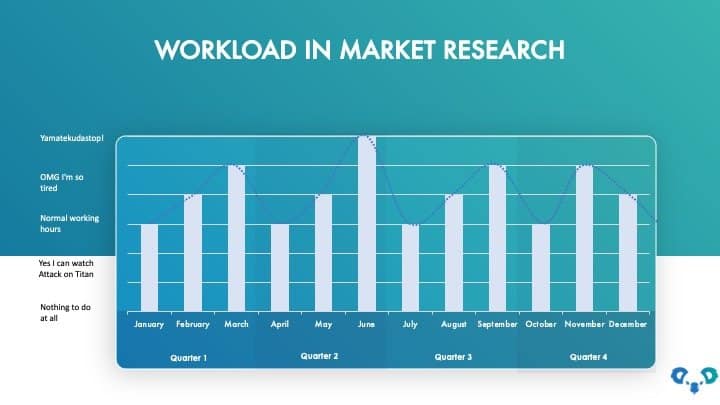
Many big companies would track their performance quarterly, from Quarter 1 to Quarter 4. This is just a general overview; some days, you may be busier than usual, working till 3 am to get clients’ deliverables on time, and some days, you (very rarely) won’t have anything to do at all.
At the beginning of the quarter, there was a lot of planning involved, then execution; towards the end of the quarter, the top management would have realised that they were lagging and would play catch up. This is when you wonder if your boss’s family tree is a ladder. They would want you to chase all the potential projects in the pipeline and close the current jobs so they can record it in the right quarter.
It’s been a year since I left the corporate world (market research agency), and I still get PTSD flashbacks and a vague sense of impending doom about having to send urgent deliverables to the client. Heh!If you plan your holiday, take it 1-2 months before, and if they ask you to cancel, tell them politely to peddle their stupidity elsewhere. Or pick the correct slot (Jan, April or July), or if you decide to live life on the edge, March, June, Sept or Nov. Most people pick December because of the festivities, but the office is empty anyway, so I prefer to work in December because it’s relaxing.

Career path for market researchers?
Most of the time, this is our career path:
- 25: I’m doing it because I love it
- 30: I’m committed to it
- 35: I have too much invested in it to quit
- 40: I’ve got nowhere to go ayyyyy
But don’t be afraid, my dear comrades; market research is a beautiful industry. Jokes aside, there are usually two typical paths for a market researcher:
- Quantitative
- They would usually go into management/regional/global role
- Join client side
- Join consultancy side
- Qualitative
- Management / regional / global role
- Join client-side (rarely)
- Become a freelancer / own business (like me)
Most client-side jobs would require a certain level of quantitative knowledge. Try to get involved, familiarise yourself with quantitative, and be more well-rounded if you aspire to work in client-side.
You need selling skills if you love and prefer to remain on the agency side. If you can bring in sales, even with crappy analytical skills, you’ll become a star. It is sad, but that’s how it is. Being commercially savvy would catapult you to instant promotion / open you to a wide range of possibilities. If you are really into analytics, being able to tell a story that would cut through all the BS would separate you from those who are back-office drones.
Another growing field is the Customer or User Experience (UI UX) job – which usually encompasses the entire consumer journey. It is gaining traction with solid growth potential.
Don’t get comfortable. Jump around so you can get a better salary, bonus and promotion. Unless you are running your own business passionately, you are basically a replaceable part of any company. The only person you need to please is yourself and maybe your partner. So do whatever the fuck makes you happy (and is legal).
After a while, I left the corporate job and decided to freelance with all the skills I acquired from my ten years in the industry. I have much more time for myself and am still going strong. However, this is not the right path for everyone, but there might be better options for people out there looking for a job / miserable with their current job.

Final Word and Free Editable CV/Resume Template
Final Word and Free Editable CV/Resume Template
CV/Resume Template 1
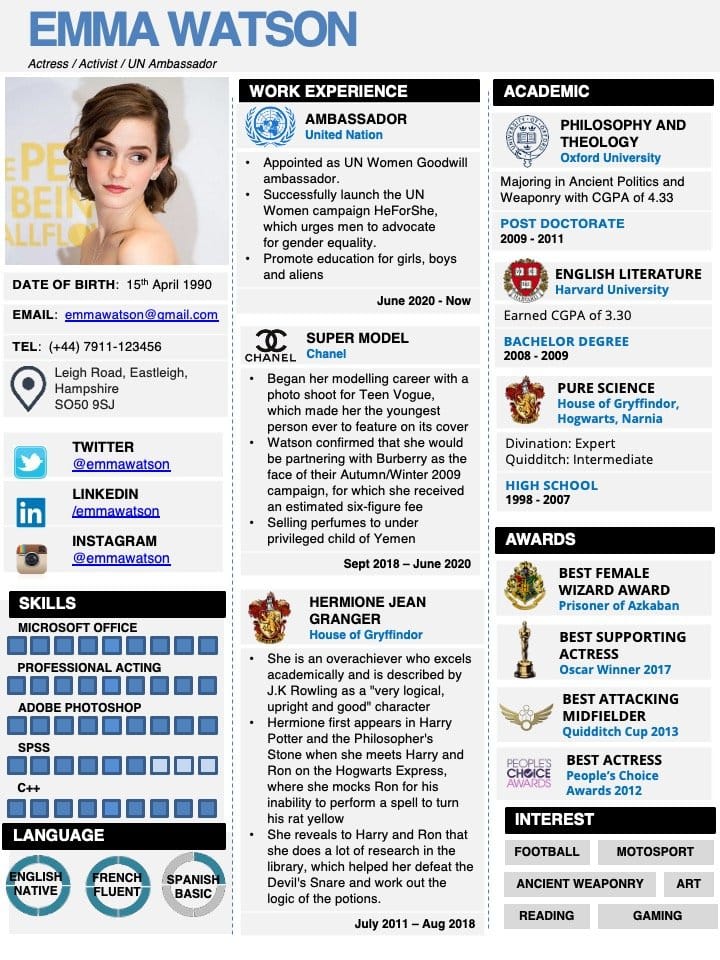
CV/Resume Template 2
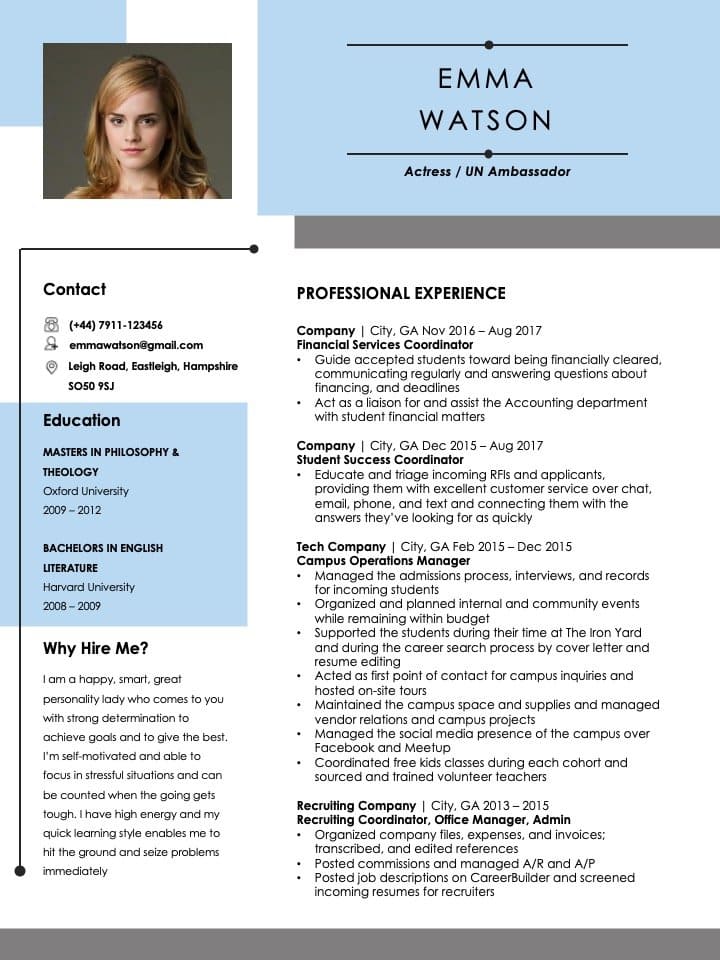
Here you go. I tried to make it as infographic as possible; change it based on your preference. I tried to sell this on Etsy, but on second thought, it is basic and easy to design. Haha, so I am just giving it away for free.
If you are going for an interview, I wish you the best of luck. Nothing wrong with being nervous. If the interviewer is skilful enough, they’ll know how to put you at ease to get a good interview. Plan your way there so you are on time.
May adrenaline carry you through. You got this. Good luck!
